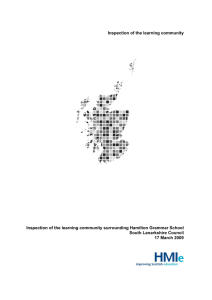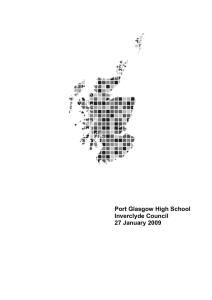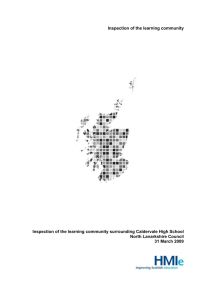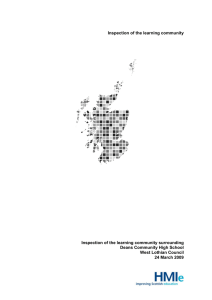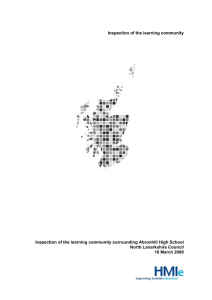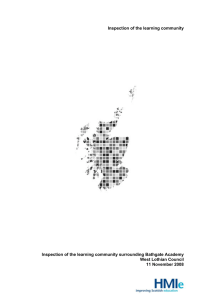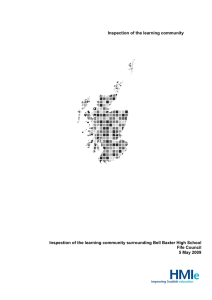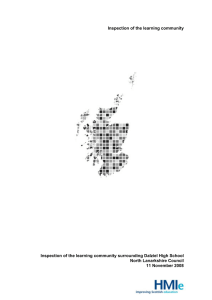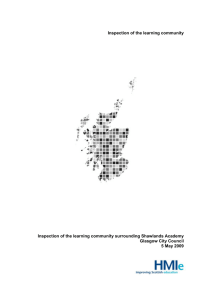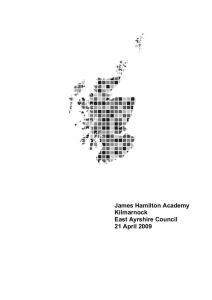Inspection of the learning community Inspection of the learning community surrounding
advertisement
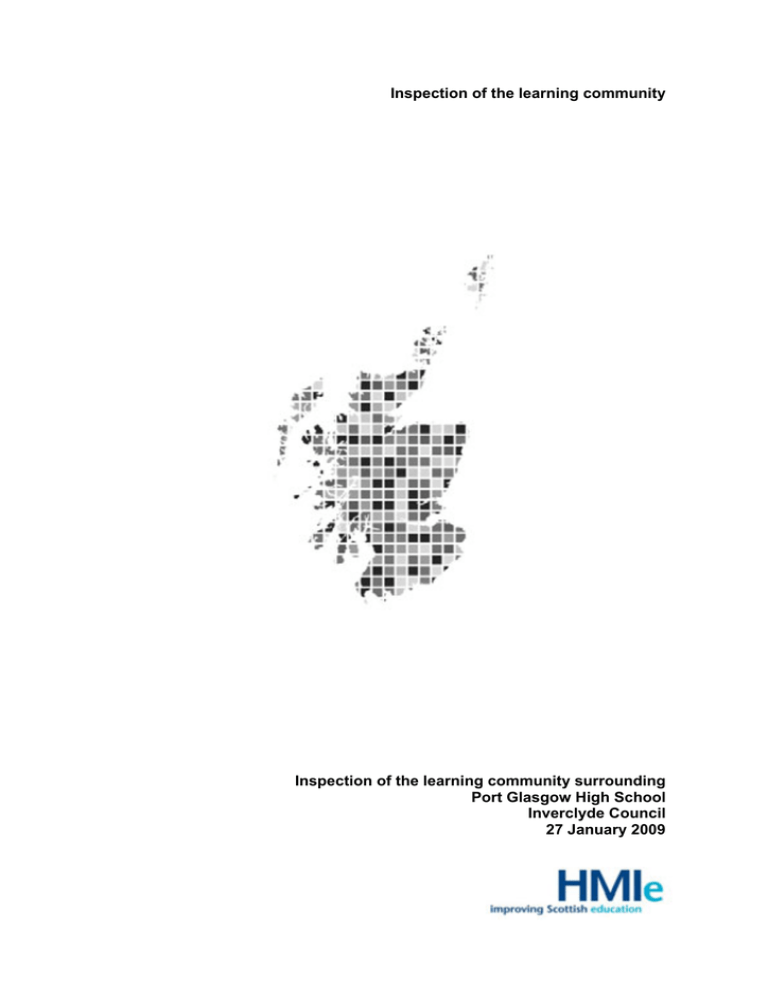
Inspection of the learning community Inspection of the learning community surrounding Port Glasgow High School Inverclyde Council 27 January 2009 Contents 1. About the report 2. The learning community 3. Particular strengths of the learning community 4. Examples of good practice 5. How well do participants learn and achieve? 6. How well does CLD help the community to develop? 7. How effective are providers in improving the quality of services? 8. Do CLD providers have a clear sense of direction? 9. What happens next? 1. About the report This report tells you about community learning and development (CLD) activities in the communities surrounding Port Glasgow High School. It complements a separate report on the school. We explain how well people involved in community learning activities do in a wide range of experiences, and the quality of learning activities on offer to them. We describe how communities can influence decision making and how they can respond positively to their own issues. We also talk about how organisations work together and how they improve lives in local communities. Finally, our report looks at the vision for the area, and how well all organisations and the community are working together to achieve it. 2. The learning community The learning community around Port Glasgow High School includes the town of Port Glasgow and the nearby village of Kilmalcolm. The proportion of jobless people is higher than the Scottish average and higher than the rest of Inverclyde Council area. Poor health, low quality housing and a stronger than average fear of crime are amongst the challenges facing the community. 3. Particular strengths of the learning community • Effective youth work and adult learning. • Strong and purposeful partnerships. • Effective engagement with, and support for, disadvantaged groups and individuals. • Core skills accreditation and celebration of wider achievements. 1 4. Examples of good practice • The strong impact of the well focused More Choices More Chances (MCMC) partnership. • Learning outcomes at Jericho House. • Progression in the Dyslexia Support Group. • Development of core skills accreditation. • Your Voices Training programme. • Reflection and self-evaluation in adult learning. By visiting www.hmie.gov.uk you can find out more about these examples of good practice. 5. How well do participants learn and achieve? Staff in the area are very committed to providing high quality services. They work well with those taking part to ensure that they get the most out of their involvement in activities. Targets for the number of adult learners are being met and in some cases exceeded. The impact of MCMC programmes is very good and performance is improving faster than other local authority areas. Young people are being helped to progress to employment, further education and training. Adult learning provision is very successful in helping to prepare potential police service recruits from the area for the Police Standard Entry Test. There is a need to improve support to local community organisations through developing a stronger focus on planned outcomes and setting measurable targets through which progress can be assessed. Young people Young people are gaining confidence and skills through taking part in well designed youth work programmes and activities. High numbers of young people are achieving awards including The Duke of Edinburgh’s Award. Young people in need of MCMC are being helped to progress into employment, further education and training. The GOALS project is helping a very high proportion of those taking part to make positive progress. Youth workers are making particular efforts to work with young people most in need of support through street based activities and some work with young people with disabilities. Young people place a very high value on the help and advice they receive. Relationships between youth workers and young people are highly positive. Many young people are able to describe how they have been helped to improve their behaviour and take up positions of responsibility. The Girl Power and street football programmes have 2 contributed to a local reduction in reported crime. Through the Speak Up group, young people have led contributions to the Inverclyde Youth Festival which attracted large numbers of participants. Opportunities for young people to reflect on their learning and development could be improved in some activities. Support to enable young people to exercise influence on wider policy and local youth issues needs to be strengthened. The positive achievements of young people need to be highlighted more strongly with local community groups and organisations. There is scope to develop intergenerational work and to improve the relationship between young people and the Community Warden Service. Adults Adults benefit from a wide range of very effective literacy and wider learning activities in the area. Those taking part are gaining confidence and are able to report improvements in their personal lives, employment and involvement in the community. Many learners are progressing on to further learning opportunities and employment. Increasing numbers are taking part in programmes which offer accreditation of core skills. Effective communication and joint-working arrangements amongst partners is contributing to the range and success of local provision. Adult learning provision with residents of Jericho House is assisting recovery for individuals with drug dependencies. Achieving certificates in core skills and gaining Community Sports Leader awards is helping participants to set longer term goals and see opportunities for progression to further learning, work or volunteering opportunities. The ABC project is enabling learners with additional support needs to use computer technology and access learning opportunities. In almost all local activities, learners recognise their achievements and are receiving effective help through individual learning plans to assess their progress. They support each other well and an annual event is held to celebrate success. Those taking part in a Dyslexia Support Group have improved confidence and are actively planning to apply their skills and knowledge to develop wider opportunities including improving services for others with dyslexia. The links between adult learning provision and community capacity building support are not sufficiently well developed. Members of local community associations could benefit from adult learning opportunities relevant to their voluntary roles. This could strengthen the ability of treasurers, secretaries and other office bearers to carry out their responsibilities with more confidence. Progression opportunities for adult learners need to be improved through further development of partnership work with James Watt College. 6. How well does CLD help the community to develop? Some activities in the area give local people opportunities to improve their community. The Council’s Community Work Team apply a well-informed and systematic approach to needs analysis with residents, community groups and organisations. Local people conduct surveys to seek views on priorities. Those taking part in the Your Voice programme reported significant improvements in confidence, knowledge and negotiation skills. They are applying these skills to seek improvements in health services and facilities in the area. Some have progressed to an accredited health issues in the community course. The Council 3 for Voluntary Service (CVS Inverclyde) provides effective support to some voluntary organisations and social enterprises delivering services in the area. Members of the Children’s Services network are sharing effective practice, developing childcare services, applying for funding and seeking tenders for service delivery. Support to some local organisations is not sufficiently effective in delivering change or improvement. The Community Council needs help to extend its membership, improve representation and develop its capacity to plan. Plans have been developed to improve support to community councils but these have not yet been implemented. Members of local residents associations are highly committed to their communities but need better, more purposeful support and training from community workers to achieve the changes they desire. Improvements in confidence, skills, knowledge and influence are not sufficient. There is a need for some groups to consider social and cultural diversity and to address negative views of young people in the community. Community workers supporting residents associations are appropriately focused on housing issues but there is also a need to give more consideration to wider regeneration issues including health, educational achievement and access to social and cultural opportunities. Joint planning and working between the staff responsible for community capacity building activity and other aspects of CLD is not sufficient. Some learning and training needs for community activists are not being met. The voice of young people in helping to determine local priorities needs more development. Overall, focus on delivering positive change needs to improve through the development of better planning and target setting. 7. How effective are providers in improving the quality of services? Staff working in the area are committed to providing high quality services. They reflect on their practice in most aspects of work and use established self-evaluation tools to assess the difference that learning activities make. The Council’s Adult Learning and Literacies team provides very good information on progress to partner organisations, tutors and learners. Managers have regular contact with learners and tutors and undertake visits to sample practice, record impact and discuss plans. Partners have effective arrangements in place to plan and implement improvements in adult learning. Annual reports are used to outline achievements, identify new developments and set priorities for improvement. Some of the information used in reports could be presented more clearly and succinctly to enable stakeholders to see more easily what progress has been made. More consistent and systematic approaches to information sharing and joint evaluation amongst provider organisations could improve understanding of outcomes achieved. Joint planning between services responsible for community capacity building and those responsible for adult learning and youth work needs to be improved. 8. Do CLD providers have a clear sense of direction? Partners work well together and have a clear sense of direction in adult learning and youth work. Leadership for CLD is strong and effective. There is a good understanding of strengths and improvement priorities in most aspects of activity. 4 Uncertainty on levels of staff and resources to provide community capacity building support is having a detrimental effect on planning for some community groups. 9. What happens next? There are some important improvements needed, but because CLD providers have a good understanding of their strengths and areas for improvement we have ended the inspection process at this stage. We will monitor progress through our regular contact with the education authority. We have agreed the following areas for improvement with the education authority and its partners. • Develop and implement a specific action plan to improve the impact of capacity building work. • Improve joint planning and working between teams and partners providing youth work and adult learning support and capacity building work. • Develop intergenerational work and plans to improve the relationship between young people and community wardens. • Improve reporting to stakeholders through more succinct and clear progress reports. 5 Quality indicators help CLD providers and inspectors to judge what is good and what needs to be improved in the work of the school. You can find these quality indicators in the HMIE publication “How good is our community learning and development? 2”. The report uses the following word scale to make clear judgements made by inspectors. Excellent Very good Good Satisfactory Weak Unsatisfactory Outstanding, sector leading Major strengths Important strengths with some areas for improvement Strengths just outweigh weaknesses Important weaknesses Major weaknesses HMIE checks five important quality indicators to keep track of how well all Scottish CLD provision is doing. Here are the results for the learning community surrounding Port Glasgow High School. Improvements in performance Impact on young people Impact on adults Impact of capacity building on communities Improving services Managing Inspector: Peter Hamilton 27 January 2009 6 good very good very good weak good How can you contact us? HMIE has responsibilities to evaluate the quality of pre-school education, all schools, teacher education, community learning and development, colleges and local authorities. We also publish reports of interest to the public and professionals about services for children and evaluate child protection services. From this extensive evidence we are able to give the professional advice needed to support the development of educational policy. For more information about the work of HMIE, including examples of good practice and links to Journey to Excellence, please visit our website at www.hmie.gov.uk. To find out more about inspections go to www.hmie.gov.uk. Please contact the Business Management and Communications Team if you require any of our information available in translated or other appropriate versions. If you wish to comment about any of our inspections, contact us at HMIEenquiries@hmie.gsi.gov.uk or alternatively you should write to Business Management and Communications Team, HM Inspectorate of Education, Denholm House, Almondvale Business Park, Almondvale Way, Livingston EH54 6GA. Our complaints procedure is available from Rona Littleproud, HM Inspectorate of Education, Denholm House, Almondvale Business Park, Almondvale Way, Livingston EH54 6GA or phone 01506 600258 or from our website at www.hmie.gov.uk. If you are not satisfied with the action we have taken at the end of our complaints procedure, you can raise a complaint with the Scottish Public Services Ombudsman (SPSO). The SPSO is fully independent and has powers to investigate complaints about Government departments and agencies. You should write to the SPSO, Freepost EH641, Edinburgh EH3 0BR. You can also telephone 0800 377 7330, fax 0800 377 7331 or email ask@spso.org.uk. More information about the Ombudsman’s office can be obtained from the website www.spso.org.uk. Want to join us? In addition to HMI, inspection teams often include people who are not HMI but are involved directly in education. They are called Associate Assessors and most work in community learning and development. Most inspection teams also include a member of the public called a Lay Member. More information about how you can become an Associate Assessor or Lay Member is available at www.hmie.gov.uk. Crown Copyright 2009 HM Inspectorate of Education 7
